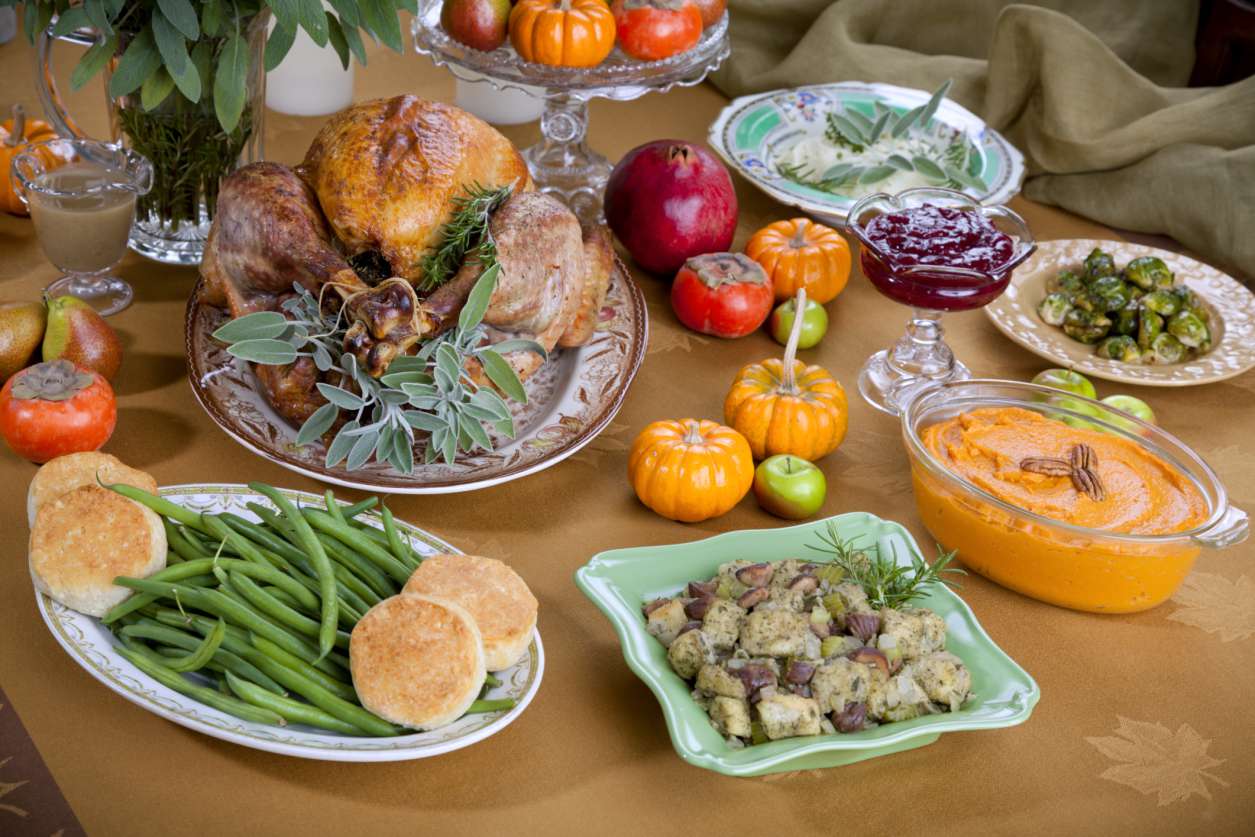
Thanksgiving is right around the corner — and many people find themselves struggling to stick to their health goals on a day associated with calorie overload, indulgence and the aftereffects of bloat and lethargy.
For those looking to lighten up a little on Thanksgiving — but still enjoy their favorite foods — Cynthia Sass, MPH, RD, Los Angeles-based sports and performance dietitian, spoke to PEOPLE about some of her savviest strategies.
Eat a high protein breakfast on Thanksgiving Day.
“You may be tempted to skip breakfast to ‘save up’ for the big meal, but research shows that a high protein breakfast helps reduce post-meal blood sugar levels throughout the entire day. Whip up a smoothie made with an unsweetened plant protein powder blended with a handful of leafy greens, a cup of fruit, a dollop of nut butter, water, and a slice of fresh ginger root.”
Make your own dish.
“If you’re attending Thanksgiving as a guest, take a dish to share, but choose something that will help balance out heavier holiday cuisine. One of my favorites is a roasted veggie platter (like extra virgin olive oil roasted bell peppers, eggplant, tomatoes, mushrooms, onions, baby Brussels sprouts, and asparagus) served with a healthy dip or sauce to drizzle, like olive tapenade, vegan (nut-based) pesto, or herbed tahini.”
Put more plants on your plate.
“Research shows that eating more whole plant-based foods can improve health outcomes and extend longevity. Consider making fully plant-based versions of Thanksgiving side dishes this year, like extra virgin olive oil sauteed green beans with sliced almonds in place of creamy green bean casserole, mashed potatoes made with vegetable broth, extra virgin olive oil, and herbs instead of butter and cream, oven roasted Brussels sprouts with sliced mushrooms in place of bacon, and garden salad garnished with diced avocado and chickpeas instead of cheese and egg.”
“You can even skip the turkey in favor of hearty lentil soup. Fully plant-based dishes can be just as delicious and satisfying as their traditional counterparts and can leave you feeling more energized.”
Be strategic about the order of the foods you eat.
“Research shows that consuming foods in the following order results in lower post-meal blood sugar levels: non-starchy vegetables first (like salad and broccoli), then high-protein foods, then oils/fats, then unprocessed complex carbohydrates (like sweet potatoes), and finally simpler sugars (dessert).”
“Starting the meal with a generous portion of non-starchy veggies ups your overall nutrient and fiber intakes and has been shown to boost satiety, reduce overall calorie intake, and help regulate post-meal blood sugar levels.”
Practice mindful eating.
“Try to put your fork down between bites, slow your eating pace, and tune into your body’s cues. I also recommend spending at least five minutes a day practicing mindfulness meditation, via a guided app or YouTube video. Being mindful can help you better tune in to your body’s hunger and fullness signals, eat with more awareness, eat slower, and feel more satiated.”
Drink water.
“Sweetened drinks like soda, sweet tea, lemonade, and punch, which are often served at holiday gatherings, aren’t filling. That means you won’t compensate by eating less, so you’re just adding excess calories to your meal. To keep it festive with no added sugar or artificial sweeteners stick with water or sparkling water garnished with a bit of fresh in-season fruit or sprigs of fresh mint.”
“Compared to soda, you’ll save about nine teaspoons of added sugar per 12 ounces. In addition, good hydration has been shown to benefit blood sugar regulation and reduce the risk of type 2 diabetes.”
Never miss a story — sign up for PEOPLE’s free daily newsletter to stay up-to-date on the best of what PEOPLE has to offer, from celebrity news to compelling human interest stories.
Eat before you drink alcohol.
“Alcohol is absorbed quickly on an empty stomach, so eat first to slow the rise in your blood alcohol level. Drinking tends to lower inhibitions and stimulate appetite, so you may eat more, or eat foods you wouldn’t reach for when sober. Also, too much alcohol can disrupt sleep, and poor sleep has been shown to increase appetite, particularly for high-calorie foods.”
Savor and enjoy what really satisfies you.
“Healthy eating isn’t about deprivation, but it makes sense to differentiate can’t-live-without holiday favorites from foods that are so-so on the satisfaction scale. Over the years numerous clients have told me that thinking this through before building their plates has helped them make more mindful choices and feel fully satisfied without overeating.”
